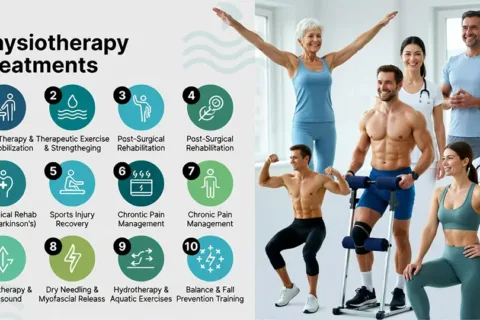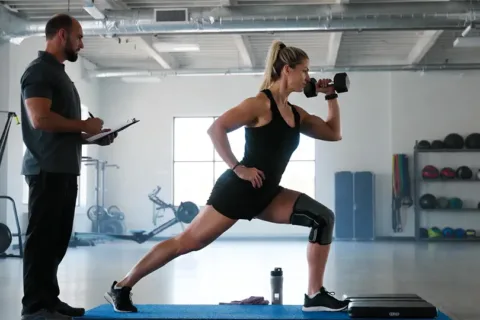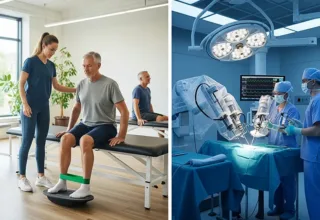Table of Contents
Your spine is the backbone of your body’s structural integrity, yet countless daily activities unknowingly compromise its health. As Dr. Iqra Kiran, a leading female physiotherapist in Rawalpindi with over 5 years of experience, I’ve witnessed first-hand how 20 Everyday Habits That Secretly Damage Your Spine can lead to chronic pain, reduced mobility, and long-term spinal complications. At Physio Rehab Solution clinic in Rawalpindi Cantt, we’ve helped hundreds of patients identify and correct these harmful patterns that gradually deteriorate spinal health.
🏥 Ready to Transform Your Spinal Health?
Don’t let daily habits destroy your spine! Schedule your comprehensive spinal assessment with Dr. Iqra Kiran today. As Rawalpindi’s premier female physiotherapist, I’ll create a personalized treatment plan to address your specific needs.
📞 Call Now: +92-321-428-777-3📧 Email: contact@physiorehabsolution.com 🌐 Visit: www.physiorehabsolution.com
Understanding Your Spine’s Vulnerability

The human spine consists of 33 vertebrae, intricate joints, muscles, and ligaments working in perfect harmony. However, modern lifestyle demands often force our spines into unnatural positions, creating stress patterns that accumulate over time. Poor spinal alignment doesn’t just cause back pain—it affects your entire musculoskeletal system, leading to headaches, reduced energy, and decreased quality of life.
The spine’s natural curves—cervical lordosis, thoracic kyphosis, and lumbar lordosis—are designed to distribute weight evenly and absorb shock during movement. When these curves are compromised through poor daily habits, the delicate balance is disrupted, leading to accelerated wear and tear on spinal structures.
The Hidden Culprits: 20 Everyday Habits That Secretly Damage Your Spine
1. Prolonged Sitting with Poor Posture

The Problem: Spending 8+ hours hunched over a desk compresses spinal discs, weakens core muscles, and creates forward head posture. This habit increases disc pressure by up to 40% compared to standing. Research shows that prolonged sitting also reduces blood flow to spinal tissues, impeding the natural healing process and nutrient delivery to intervertebral discs.
The Fix: Implement the 20-20-20 rule: every 20 minutes, stand for 20 seconds and look 20 feet away. Invest in an ergonomic chair that supports your lumbar curve. Keep your feet flat on the floor, shoulders relaxed, and monitor at eye level. Consider using a standing desk converter for 2-3 hours daily to reduce cumulative sitting time. Perform seated spinal twists and shoulder blade squeezes throughout the day.
Professional Insight: At Physio Rehab Solution, we’ve observed that office workers who follow proper ergonomic principles show 60% fewer complaints of lower back pain compared to those with poor workstation setups.
2. Sleeping on Your Stomach

The Problem: Stomach sleeping forces your neck into extreme rotation and flattens the natural lumbar curve, straining cervical vertebrae and lower back muscles. This position can cause morning stiffness, neck pain, and contribute to disc degeneration over time.
The Fix: Transition to side sleeping with a pillow between your knees, or back sleeping with a pillow under your knees. Use a cervical support pillow to maintain proper neck alignment. If you must sleep on your stomach temporarily, place a thin pillow under your pelvis to reduce lumbar stress.
Gradual Transition Tips: Change sleeping positions gradually over 2-3 weeks. Use body pillows to prevent rolling back to stomach position during sleep. Practice relaxation techniques in your new position before falling asleep.
3. Using Your Phone with “Text Neck”

The Problem: Looking down at your phone adds 60 pounds of pressure on your cervical spine, equivalent to carrying an 8-year-old child on your neck. This forward head posture also causes muscle imbalances, with neck extensors becoming overstretched while flexors become tight and shortened.
The Fix: Hold your phone at eye level, take frequent breaks, and perform neck stretches. Consider using voice-to-text features to reduce typing time. Set reminders to check your posture every 30 minutes.
Specific Exercises: Perform chin tucks (10 reps every hour), upper trap stretches, and neck rotations. Use smartphone apps that remind you to maintain proper posture throughout the day.
4. Carrying Heavy Bags on One Shoulder

The Problem: Uneven weight distribution creates muscle imbalances, lateral spinal curvature, and compensatory movement patterns that stress joints. Chronic one-sided carrying can lead to scoliotic postures and hip misalignment.
The Fix: Use a backpack with padded straps, switch sides regularly, or use wheeled luggage. Keep bags under 10% of your body weight. Distribute weight evenly between multiple smaller bags rather than one heavy bag.
Additional Solutions: Strengthen your core and postural muscles to better handle asymmetrical loads. Perform side-bending stretches after carrying heavy bags to counteract lateral compression.
5. Improper Lifting Techniques

The Problem: Bending at the waist instead of the knees places enormous stress on lumbar discs and can cause immediate injury or gradual deterioration. Improper lifting is responsible for 25% of all workplace injuries affecting the spine.
The Fix: Squat down, keep your back straight, engage your core, and lift with your legs. Hold objects close to your body and avoid twisting while lifting. Plan your lift trajectory before moving heavy objects.
Advanced Techniques: Learn the golfer’s lift for lighter objects, practice breathing techniques during lifting (exhale during exertion), and use lifting aids when available. Never lift when fatigued or rushed.
💪 Experiencing Back Pain from Lifting?
Don’t ignore the warning signs! Our specialized Back Pain Treatment programs at Physio Rehab Solution combine physiotherapy, chiropractic care, and pain management techniques to get you back to pain-free movement.
Book Your Assessment Today:
- ✅ Same-day appointments available
- ✅ Insurance accepted
- ✅ Female physiotherapist in comfortable environment
Contact Dr. Iqra Kiran: +92-321-428-777-3
6. Wearing High Heels Regularly
The Problem: Heels alter your center of gravity, forcing your lower back to arch excessively and creating muscle tension throughout the kinetic chain. Regular high heel use can shorten calf muscles and alter walking mechanics permanently.
The Fix: Limit heel height to 2 inches, take breaks in flat shoes, stretch your calves regularly, and strengthen your core muscles to support proper alignment. Alternate between different heel heights throughout the week.
Compensatory Exercises: Perform calf stretches, hip flexor stretches, and strengthen your glutes and deep core muscles to counteract the effects of heel wearing.
7. Slouching While Driving

The Problem: Extended driving with poor seat positioning strains the lumbar spine and creates hip flexor tightness that pulls on the lower back. Vibrations from the vehicle also contribute to disc degeneration over time.
The Fix: Adjust your seat so knees are slightly higher than hips, use lumbar support, and take breaks every hour to stretch and walk. Keep the steering wheel close enough to maintain a slight bend in your elbows.
Long-Distance Driving Tips: Use cruise control when possible to reduce leg tension, adjust mirrors properly to avoid neck strain, and perform in-seat exercises during traffic stops.
8. Ignoring Core Strength

The Problem: Weak abdominal and back muscles fail to provide adequate spinal support, leading to increased stress on vertebrae and discs. Core weakness is often the underlying cause of recurrent back pain episodes.
The Fix: Incorporate daily core exercises like planks, bird dogs, and dead bugs. Focus on deep core stabilizers rather than just superficial “six-pack” muscles. Start with 5-10 minutes daily and gradually increase duration.
Progressive Program: Week 1-2: Basic holds (10-30 seconds), Week 3-4: Dynamic movements, Week 5-6: Functional exercises, Week 7-8: Sport-specific or advanced variations.
9. Stress and Muscle Tension

The Problem: Chronic stress causes involuntary muscle contractions, particularly in the neck, shoulders, and back, creating spinal stiffness and pain. Stress hormones also interfere with tissue healing and pain perception.
The Fix: Practice stress management techniques including deep breathing, meditation, regular exercise, and adequate sleep. Consider massage therapy or physiotherapy for muscle tension relief.
Stress-Busting Techniques: Progressive muscle relaxation, yoga, tai chi, and mindfulness meditation have all shown effectiveness in reducing spinal tension and pain.
10. Sedentary Lifestyle

The Problem: Lack of movement leads to muscle atrophy, joint stiffness, and poor circulation that impairs the spine’s natural healing processes. Sedentary behaviour is linked to increased inflammation and metabolic dysfunction.
The Fix: Aim for 150 minutes of moderate exercise weekly, including walking, swimming, or yoga. Even short movement breaks throughout the day make a significant difference.
Movement Integration: Take stairs instead of elevators, park farther away, use walking meetings, and incorporate desk exercises into your routine.
11. Poor Workplace Ergonomics

Modern workstations often lack proper ergonomic support, forcing workers into sustained awkward positions. At Physio Rehab Solution, we recommend ergonomic assessments to optimize your workspace for spinal health. Poor monitor placement, inadequate lighting causing neck strain, and improper keyboard height all contribute to spinal dysfunction.
Complete Ergonomic Setup: Monitor top should be at eye level, keyboard at elbow height, feet flat on floor or footrest, document holder at screen level, and adequate lighting to prevent leaning forward.
🏢 Corporate Wellness Programs Available!
Protect your employees’ spinal health with our comprehensive Workplace Ergonomic Assessments. Dr. Iqra Kiran provides on-site evaluations and training sessions to reduce workplace injuries and improve productivity.
Services Include:
- Individual workstation assessments
- Group training sessions
- Injury prevention workshops
- Follow-up consultations
Contact us for corporate rates: +92-321-428-777-3
12. Excessive Weight Gain

Extra weight, particularly around the midsection, shifts your center of gravity forward and increases lumbar lordosis. Maintaining a healthy weight through proper nutrition and exercise reduces spinal stress significantly. Every extra pound adds approximately 4 pounds of pressure to your lower back.
Weight Management Strategies: Focus on anti-inflammatory foods, maintain proper hydration, control portion sizes, and combine cardiovascular exercise with strength training for optimal results.
13. Dehydration Affecting Disc Health

Spinal discs are 80% water, and dehydration reduces their shock-absorbing capacity. Drink at least 8 glasses of water daily to maintain disc hydration and flexibility. Dehydration also affects muscle function and joint lubrication.
Hydration Protocol: Drink water upon waking, before meals, and monitor urine color as a hydration indicator. Limit caffeine and alcohol which can contribute to dehydration.
14. Wearing Unsupportive Footwear

Shoes without proper arch support or cushioning create a chain reaction of poor alignment from your feet to your spine. Invest in quality shoes with appropriate support for your foot type. Flat shoes and flip-flops provide minimal support for daily activities.
Footwear Guidelines: Replace shoes every 300-500 miles for runners, choose shoes based on your gait pattern, and use custom orthotics if recommended by healthcare professionals.
15. Sleeping on Worn-Out Mattresses

Old mattresses lose their ability to support spinal alignment, causing you to wake up stiff and sore. Replace mattresses every 7-10 years and choose medium-firm options for optimal support. Your sleep surface significantly impacts spinal recovery during rest.
Sleep Environment Optimization: Maintain cool temperature (65-68°F), use blackout curtains, minimize electronic devices, and establish consistent sleep schedules for better rest quality.
16. Repetitive Movements Without Breaks

Whether typing, assembly line work, or sports activities, repetitive motions without variation create overuse injuries and muscle imbalances affecting spinal health. Micro-breaks and movement variety are essential for preventing cumulative trauma disorders.
Repetitive Strain Prevention: Vary tasks throughout the day, use proper technique, take micro-breaks every 30 minutes, and perform counteracting stretches regularly.
17. Poor Breathing Patterns

Shallow chest breathing instead of deep diaphragmatic breathing reduces core stability and increases neck and shoulder tension, indirectly affecting spinal alignment. Proper breathing supports spinal stability and reduces muscle tension.
Breathing Exercises: Practice 4-7-8 breathing, box breathing, and diaphragmatic breathing exercises daily. Focus on expanding your ribcage laterally rather than lifting your chest.
18. Neglecting Flexibility and Mobility

Tight muscles, particularly hip flexors, hamstrings, and thoracic spine, create compensatory movement patterns that stress the lumbar spine. Regular stretching maintains proper muscle length and joint range of motion.
Essential Stretches: Hip flexor stretches, hamstring stretches, thoracic spine rotations, and piriformis stretches should be performed daily for optimal spinal health.
19. Ignoring Early Warning Signs

Many people dismiss minor aches and stiffness, allowing small problems to develop into major spinal issues requiring extensive treatment. Early intervention is always more effective than treating chronic conditions.
Warning Signs to Address: Morning stiffness lasting more than 30 minutes, pain with specific movements, radiating symptoms, and progressively worsening discomfort.
20. Self-Treating Without Professional Guidance

While self-care is important, attempting to treat spinal problems without proper diagnosis can worsen conditions or mask underlying issues. Professional assessment ensures appropriate treatment and prevents complications.
⚠️ Don’t Wait Until It’s Too Late!
Early intervention is key to preventing chronic spinal problems. If you’re experiencing any of these warning signs, schedule your consultation with Dr. Iqra Kiran immediately:
- Morning stiffness lasting over 30 minutes
- Pain radiating down your arms or legs
- Numbness or tingling sensations
- Difficulty performing daily activities
Emergency Consultation Available Call: +92-321-428-777-3 | WhatsApp: +92-321-428-777-3
The Science Behind Spinal Degeneration
Understanding how daily habits contribute to spinal degeneration helps motivate positive changes. Intervertebral discs receive nutrients through diffusion during movement and rest cycles. When movement is restricted or positions are sustained, this nutritional exchange is compromised, leading to disc dehydration and eventual breakdown.

Muscle imbalances create altered movement patterns that place abnormal stress on spinal structures. Over time, these compensatory patterns become habitual, leading to accelerated wear and tear on joints, ligaments, and discs.
Professional Solutions at Physio Rehab Solution
As Rawalpindi’s leading physiotherapy clinic, Physio Rehab Solution offers comprehensive spinal health services under one roof. Our multidisciplinary approach includes:
Physiotherapy: Customized exercise programs, manual therapy, and movement education to restore proper spinal function and prevent future problems. Our evidence-based treatments include McKenzie Method, Mulligan Concept, and neuromuscular re-education techniques.
Chiropractic Care: Spinal adjustments and joint mobilization to improve alignment and reduce pain. We utilize various techniques including diversified, activator, and soft tissue mobilization approaches.
Acupuncture: Traditional healing techniques to reduce inflammation and promote natural pain relief. Research supports acupuncture’s effectiveness for chronic low back pain and neck pain conditions.
Pain Management: Advanced therapeutic modalities including ultrasound, electrical stimulation, and heat/cold therapy. We also provide education on pain science and self-management strategies.
Specialized Programs: Post-surgical rehabilitation, sports injury recovery, pregnancy-related back pain management, and ergonomic assessments for workplace injury prevention.
🎯 Complete Spine Care Under One Roof
Why visit multiple specialists when Dr. Iqra Kiran’s Physio Rehab Solution offers everything you need?
Our Comprehensive Services:
- ✅ Physiotherapy & Rehabilitation
- ✅ Chiropractic Care
- ✅ Acupuncture Treatment
- ✅ Pain Management
- ✅ Sports Injury Recovery
- ✅ Post-Surgical Care
Special Introductory Offer: 20% off your first consultation Book Now: +92-321-428-777-3 | Online: www.physiorehabsolution.com
Demographic-Specific Considerations
Office Workers: Focus on ergonomic improvements, postural strengthening, and movement integration throughout the workday. Regular physiotherapy sessions can prevent chronic conditions common in desk-bound professions.

Athletes: Emphasis on sport-specific movement patterns, injury prevention protocols, and performance optimization while maintaining spinal health.

Seniors: Age-related changes require modified approaches focusing on flexibility, balance, and fall prevention while addressing degenerative changes safely.

Pregnant Women: Specialized care for pregnancy-related spinal changes, safe exercise modifications, and postural adaptations for growing belly support.

Creating Lasting Change
Transforming harmful habits into spine-healthy behaviors requires consistency and professional guidance. Start by identifying which of these 20 habits apply to your daily routine, then systematically address them one at a time.
Week 1-2: Focus on posture awareness and ergonomic improvements Week 3-4: Implement core strengthening exercises Week 5-6: Address sleep position and stress management Week 7-8: Establish regular movement patterns and flexibility routines
Long-term Success Strategies: Track progress with pain scales and functional measures, celebrate small victories, build support systems, and maintain regular check-ups with healthcare professionals.
📋 Free Spine Health Assessment Checklist
Download our comprehensive spine health evaluation tool to identify your risk factors and track your progress. Created by Dr. Iqra Kiran, this professional assessment helps you understand your current spinal health status.
Get Your Free Checklist:
- Email: contact@physiorehabsolution.com
- WhatsApp: +92-321-428-777-3
- Website: www.physiorehabsolution.com/free-assessment
The Economic Impact of Spinal Health
Poor spinal health costs individuals and employers billions annually in healthcare expenses and lost productivity. Investing in prevention through proper habits, ergonomic improvements, and professional care yields significant returns in reduced medical costs and improved quality of life.
Studies show that comprehensive spinal health programs reduce absenteeism by 30% and healthcare costs by 25% while improving employee satisfaction and productivity.
Patient Success Stories
“Dr. Iqra is a very good, hardworking and experienced doctor. We always seek treatment from her along with our family. Alhamdulillah, may Allah grant us further progress.” – Mukhtar Ahmed
“I wanna give an honest review not a paid review, Dr. Iqra is a sweet and friendly doctor, not like ordinary doctors who have made this profession a business, i came to the clinic with my mother who had multiple issues like cervical pain and pelvic pain etc, also i had nerve impinchment and also cervical pain Alhamdulillah, my cervical pain has been resolved, i had a hijama for pcos the 1st session was quite good. Dr. Iqra is quite honest with her work and specializes in what she does. I recommend her.😍” – Ayesha Farheen
“I had sessions of physiotherapy for my frozen shoulder and neck issues with Dr Iqra Kiren. I got only 10 sessions along with hijjama and i saw significant changes in my body. I feel my muscles relaxed with major changes in mobility. She has experties in all joins and muscle issues , her recommended moves and streches made a significant differences. I highly recommended her to all patients suffering from all kind of muscles and joint pains.” – Shehnaz Akhtar Awan
The Road to Recovery
Whether you’re experiencing current back pain or want to prevent future problems, addressing these everyday habits is crucial for long-term spinal health. At our Rawalpindi clinic, we’ve seen remarkable transformations when patients commit to changing these damaging patterns.
Recovery is a process that requires patience, consistency, and professional guidance. Small improvements compound over time, leading to significant long-term benefits for spinal health and overall well-being.
Remember, your spine supports you every day—it’s time to return the favor. Small changes in daily habits can yield significant improvements in pain levels, mobility, and overall quality of life.
Why Choose Dr. Iqra Kiran & Physio Rehab Solution?
✅ 5+ Years Specialized Experience in spinal health and rehabilitation ✅ Female Physiotherapist providing comfortable care for all patients ✅ Comprehensive Services – Physiotherapy, Chiropractic, Acupuncture, Pain Management ✅ Evidence-Based Treatment using latest research and proven techniques ✅ Convenient Location in Rawalpindi Cantt with easy accessibility ✅ Flexible Scheduling including evening and weekend appointments ✅ Insurance Accepted making quality care affordable ✅ Proven Results with hundreds of successful patient outcomes
Take Action Today – Multiple Ways to Get Started
Don’t wait until minor discomfort becomes chronic pain. If you’re experiencing any spinal issues or want to optimize your spine health, contact Dr. Iqra Kiran at Physio Rehab Solution. As the premier female physiotherapist in Rawalpindi, I’m committed to helping you achieve optimal spinal health through evidence-based treatment and personalized rehabilitation programs.
🚀 Ready to Transform Your Spinal Health? Choose Your Next Step:
📞 IMMEDIATE CONSULTATION Call Dr. Iqra Kiran directly for urgent concerns Phone: 92-321-428-777-3 Available: Monday-Sunday, 10 AM – 9 PM
💬 WHATSAPP CONSULTATION Quick questions? Send a message for fast response WhatsApp: +92-321-428-777-3 Response time: Within 2 hours
📧 EMAIL INQUIRY Detailed questions or appointment requests Email: contact@physiorehabsolution.com Response time: Within 24 hours
🌐 ONLINE BOOKING Schedule your appointment 24/7 Website: www.physiorehabsolution.com Select your preferred date and time
📍 VISIT OUR CLINIC Physio Rehab Solution H# 1013, Afshan Colony Rawalpindi Cantt
📱 FOLLOW US FOR DAILY TIPS Stay updated with spine health tips and exercises Facebook: @Physiorehabsolution Instagram: @Physiorehabsolution YouTube: @Physiorehabsolution
Your spine is your lifeline—protect it with the care it deserves. Book your consultation today and take the first step toward a pain-free, healthy future. Our comprehensive approach addresses not just symptoms but underlying causes, ensuring lasting results and improved quality of life.
Don’t let another day pass in pain. Your journey to optimal spinal health starts with one call!
FAQs (Frequently Ask Questions)
What are the most common everyday habits that damage your spine?
The 20 most damaging everyday habits include prolonged sitting with poor posture, sleeping on your stomach, text neck from phone use, carrying heavy bags on one shoulder, improper lifting techniques, wearing high heels regularly, slouching while driving, ignoring core strength, chronic stress, and maintaining a sedentary lifestyle. Dr. Iqra Kiran at Physio Rehab Solution in Rawalpindi identifies these habits as primary causes of spinal dysfunction and chronic back pain in her patients.
How do I know if my daily habits are damaging my spine?
Warning signs include morning stiffness lasting over 30 minutes, pain with specific movements, radiating symptoms down arms or legs, frequent headaches, muscle tension, and progressively worsening discomfort. If you experience any of these symptoms in Rawalpindi, schedule an assessment with Dr. Iqra Kiran, the leading female physiotherapist specializing in spine health diagnosis and treatment.
Can poor posture really cause permanent spinal damage?
Yes, chronic poor posture can lead to permanent structural changes including disc degeneration, muscle imbalances, and altered spinal curves. However, early intervention with professional physiotherapy can prevent and reverse many postural problems. At Physio Rehab Solution, Dr. Iqra Kiran uses evidence-based postural correction techniques to restore proper spinal alignment and prevent long-term damage.
How long does it take to correct bad spinal habits?
Habit modification typically takes 21-66 days, while physical improvements vary based on severity. Simple postural changes show benefits within 2-4 weeks, while addressing muscle imbalances and structural issues may take 8-12 weeks with consistent physiotherapy. Dr. Iqra Kiran creates personalized timelines based on individual assessments at her Rawalpindi clinic.
What treatments does Dr. Iqra Kiran offer for spine problems in Rawalpindi?
Dr. Iqra Kiran at Physio Rehab Solution offers comprehensive spine care including physiotherapy, chiropractic care, acupuncture, pain management, manual therapy, exercise prescription, postural correction, ergonomic assessments, and specialized rehabilitation programs. As Rawalpindi’s leading female physiotherapist, she provides evidence-based treatments for all spinal conditions under one roof.
Is physiotherapy effective for chronic back pain?
Yes, physiotherapy is highly effective for chronic back pain, with studies showing 60-80% improvement rates. Dr. Iqra Kiran uses advanced techniques including McKenzie Method, manual therapy, therapeutic exercises, and pain management strategies to address underlying causes of chronic pain rather than just symptoms. Her comprehensive approach at Physio Rehab Solution has helped hundreds of Rawalpindi patients achieve lasting pain relief.
How often should I attend physiotherapy sessions for spine problems?
Treatment frequency depends on condition severity and individual needs. Typically, acute conditions require 2-3 sessions per week for 4-6 weeks, while chronic conditions may need 1-2 sessions weekly for 8-12 weeks. Dr. Iqra Kiran develops personalized treatment schedules based on your specific spine health needs and recovery goals at her Rawalpindi clinic.
Can I do physiotherapy exercises at home?
Yes, home exercises are crucial for successful spine rehabilitation. Dr. Iqra Kiran provides customized home exercise programs including core strengthening, flexibility routines, and postural exercises. However, professional supervision ensures proper technique and progression. Regular check-ins at Physio Rehab Solution optimize your home program for maximum effectiveness.
What is text neck and how can physiotherapy help?
Text neck is forward head posture caused by prolonged phone use, adding up to 60 pounds of pressure on cervical vertebrae. Symptoms include neck pain, headaches, and shoulder tension. Dr. Iqra Kiran treats text neck through postural correction, neck strengthening exercises, manual therapy, and ergonomic education at Physio Rehab Solution in Rawalpindi.
Can physiotherapy help with herniated discs?
Yes, physiotherapy is often the first-line treatment for herniated discs. Dr. Iqra Kiran uses specialized techniques including McKenzie exercises, traction, core stabilization, and progressive loading to reduce disc pressure and promote healing. Many patients at her Rawalpindi clinic avoid surgery through comprehensive physiotherapy management.
How does stress affect spine health?
Chronic stress causes muscle tension, particularly in neck and back muscles, leading to spinal stiffness and pain. Stress hormones also interfere with tissue healing and pain perception. Dr. Iqra Kiran incorporates stress management techniques, relaxation training, and movement therapy into spine treatment plans at Physio Rehab Solution.
Can pregnancy-related back pain be treated safely?
Yes, Dr. Iqra Kiran specializes in pregnancy-related spine care, offering safe and effective treatments for expectant mothers in Rawalpindi. Services include prenatal physiotherapy, gentle exercises, postural education, and specialized techniques to address growing belly-related spinal changes without risk to mother or baby.










1 thought on “20 Everyday Habits That Secretly Damage Your Spine (And How to Fix Them)”
global weed delivery service reaching multiple continents